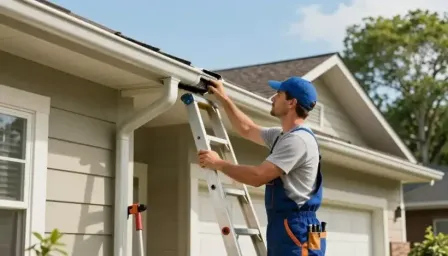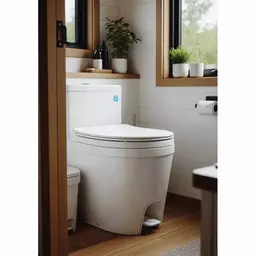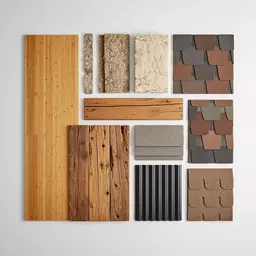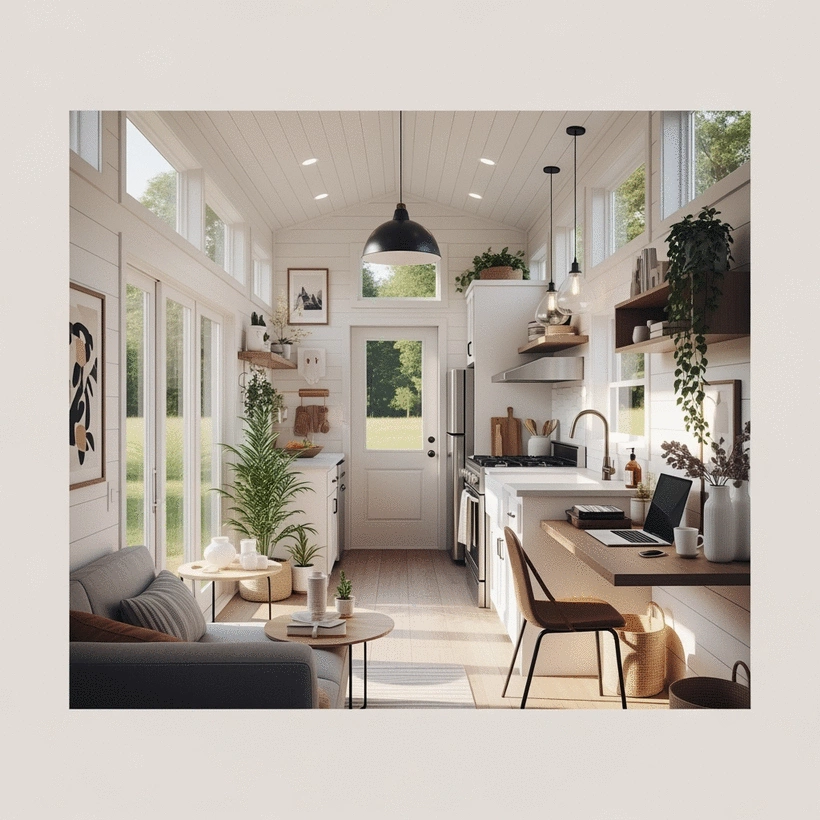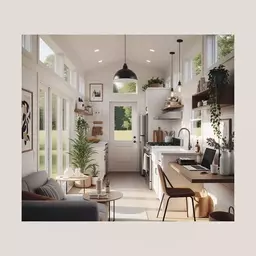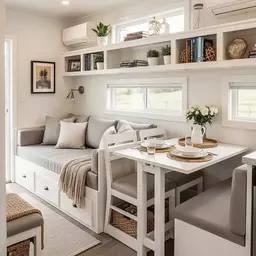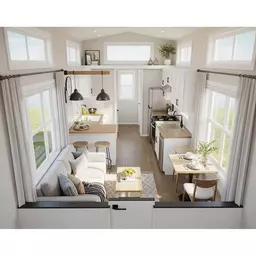Purchasing Off-Grid Systems in Australia
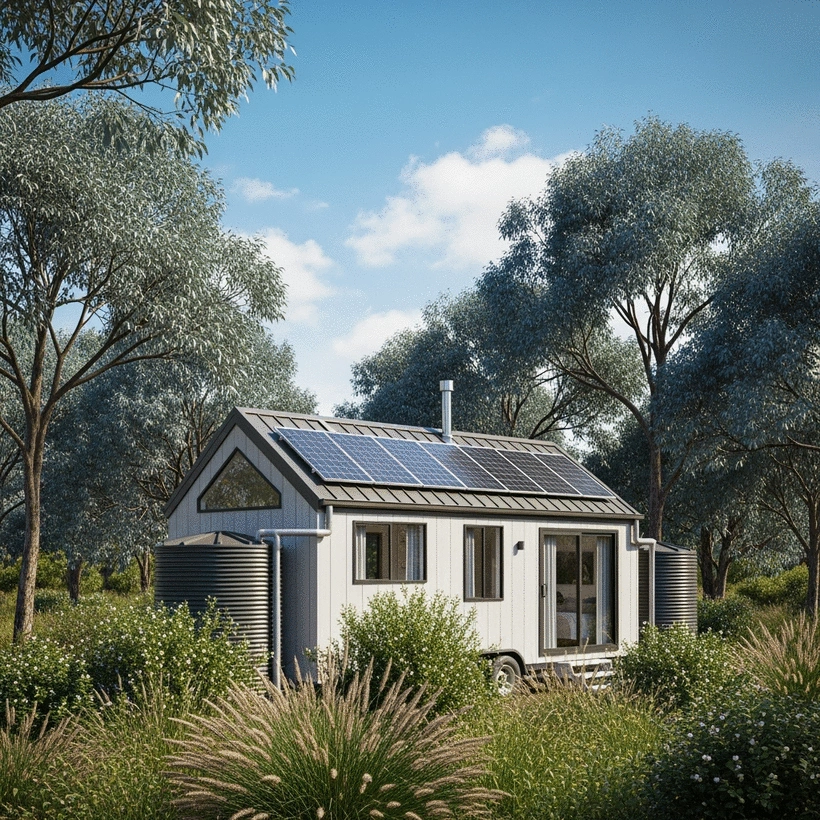
As you contemplate the possibility of off-grid living, consider how this lifestyle not only enriches your personal space but also fosters a deeper connection with nature. What if you could power your home sustainably while embracing simplicity? Let's explore the transformative potential of off-grid tiny homes in Australia!
What You Will Learn
- The significance of energy independence in achieving sustainable living through solar power.
- How off-grid systems can lead to significant cost savings on utilities over time.
- The environmental benefits of using renewable energy sources to reduce your carbon footprint.
- Key components necessary for creating a successful off-grid setup in your tiny home.
- Important factors to consider when purchasing off-grid solar and water systems.
- The advantages of joining an off-grid community for shared resources and knowledge.
- Exciting trends indicating the future growth of off-grid living in Australia.
Key Components & Purchasing Considerations for Off-Grid Systems
This visual highlights the essential elements of an off-grid tiny home setup and crucial factors for making informed purchasing decisions. Understanding these components is vital for anyone looking into budgeting your tiny home build and ensuring long-term sustainability.
Key Off-Grid Components
- ☉ Solar Panels
- ⚡ Battery Storage
- 💧 Water Systems
Informed Purchases
- ★ Quality Components
- 📄 Manufacturer Reputation
- 📜 Warranty Options
- 📈 Performance Ratings
- 🛠 Installation Support
Benefits of Off-Grid Living
- 🔋 Energy Independence
- 💰 Cost Savings
- 🌍 Environmental Impact
- 🤝 Self-Sufficiency
Future Trends & Growth
- 🚀 Tech Advancements
- 📆 Government Support
- 📣 Awareness Campaigns
- 🌐 Community Growth
Understanding Off-Grid Living for Tiny Homes in Australia
As we dive into the world of tiny homes, one aspect that truly stands out is the concept of off-grid living. This approach not only promotes energy independence but also aligns perfectly with our mission at Luxe Tiny Homes to inspire Australians toward a more sustainable lifestyle. By harnessing the power of nature, off-grid living allows us to simplify our lives while caring for the environment.
Imagine being able to generate your own electricity and collect your own water, all while enjoying the beauty of a minimalist home. This is the magic of off-grid systems, which offer numerous benefits, making them an appealing choice for those looking to downsize their footprint without sacrificing comfort.
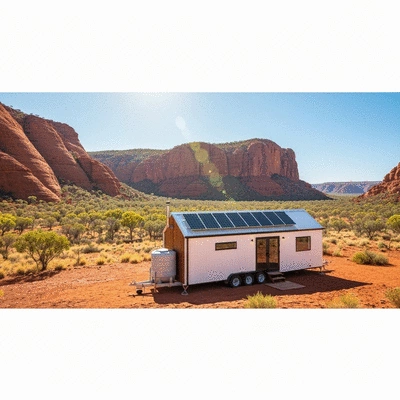
Benefits of Off-Grid Solar and Water Systems
- Energy Independence: By utilizing solar panels, you become less reliant on traditional energy sources and can power your home sustainably.
- Cost Savings: Off-grid systems can significantly lower your utility bills over time, allowing you to allocate funds to experiences rather than expenses.
- Environmental Impact: Using renewable energy sources reduces your carbon footprint, contributing positively to the planet's health.
- Self-Sufficiency: Living off-grid fosters a sense of independence and self-reliance, encouraging you to grow your resources.
Choosing to implement off-grid systems not only supports your personal goals but also helps foster a community of like-minded individuals who value sustainability and environmental stewardship. For more on creating an eco-friendly space, explore eco-friendly materials for tiny homes.
Key Components of Off-Grid Systems
To create a successful off-grid setup in your tiny home, it's crucial to understand the key components involved. Each element works harmoniously to ensure you have a reliable energy and water supply.
- Solar Panels: The heart of your energy system, solar panels convert sunlight into electricity, powering everything from lights to appliances.
- Battery Storage: These systems store energy generated during sunny days, ensuring you have power even on cloudy days or at night.
- Water Systems: From rainwater catchment systems to filtration setups, these components ensure a clean and sustainable water supply.
By understanding these essential components, you can make informed decisions about your tiny home’s off-grid capabilities. It's all about creating a space that not only reflects your style but also aligns with your values!
Comprehensive Guide to Off-Grid Solar Solutions
Now that we've established the foundation of off-grid living, let’s explore the different solar solutions available for your tiny home.
We Want to Hear From You!
What aspect of off-grid living excites you the most? Is it the idea of energy independence, cost savings, or perhaps the chance to connect with a community of like-minded individuals? Share your thoughts below:
Making Informed Purchases for Off-Grid Systems
When it comes to purchasing off-grid solar and water systems, there are several key factors to keep in mind. Making informed decisions can lead to a more sustainable and efficient tiny home living experience. Whether you're a newcomer to tiny living or looking to upgrade your current setup, understanding what to look for is crucial!
First, consider the quality of components you are buying. Ensure that your solar panels are durable and have high energy efficiency ratings. Look for water systems that have reliable filtration methods to ensure safe drinking water. This not only enhances your living experience but also contributes to your commitment to a sustainable lifestyle.
- Manufacturer Reputation: Research suppliers with a solid track record and positive user reviews.
- Warranty Options: Check warranty terms for both solar panels and water systems to protect your investment.
- Performance Ratings: Look for systems that offer high efficiency and reliability, especially in varying weather conditions.
- Installation Support: Choose suppliers who provide guidance on installation, whether DIY or professional.
By taking these factors into account, you can ensure that your off-grid systems are not only efficient but also aligned with your values of sustainability and minimalism. Remember, every step you take towards making informed purchases is a step towards embracing a greener lifestyle!

Take the Next Step Toward Off-Grid Living
Are you excited about the prospect of off-grid living? Now is the perfect time to dive deeper into the possibilities! I encourage you to research suppliers and explore various options available in the Australian market. Look for companies that align with your values and vision for sustainable living.
Take a moment to envision yourself in your tiny home, supported by a reliable off-grid system. What features excite you the most? Whether it’s the beauty of solar panels harnessing the sun's energy or a rainwater collection system providing fresh water, the journey to off-grid living is filled with potential. Let's take those steps together!
Exploring Off-Grid Communities and Their Benefits
Joining an off-grid community can be a life-changing decision. It offers you the chance to connect with like-minded individuals who share your passion for sustainable living. In these communities, you can exchange ideas, resources, and experiences!
- Shared Knowledge: Benefit from the collective knowledge of community members who are experienced in off-grid living.
- Resource Sharing: Pool resources such as tools, equipment, and even skills for DIY projects.
- Supportive Environment: Enjoy a sense of belonging and support from people who understand your lifestyle choice.
- Collaborative Projects: Participate in community initiatives that promote sustainability and environmental consciousness.
Being part of an off-grid community not only enhances your living experience but also strengthens your commitment to eco-friendly practices. Are you ready to find your tribe?
Future of Off-Grid Living in Australia
The future of off-grid living in Australia is bright! With the rise of innovative technologies and a growing focus on renewable energy, we are seeing exciting trends emerge. More Australians are recognizing the benefits of eco-friendly products and sustainable practices, making off-grid living a more viable option than ever before. For those interested in innovative designs, exploring 2025 tiny home design ideas can provide ample inspiration.
As we move forward, I believe that we will witness a significant increase in the availability of affordable solar and water solutions tailored for tiny homes. Moreover, as communities continue to form around this lifestyle, the exchange of ideas and resources will only strengthen our collective efforts toward a sustainable future.
- Advancements in Technology: Expect continual improvements in solar panel efficiency and battery storage solutions.
- Government Support: Increased incentives and grants will likely encourage more people to adopt off-grid systems.
- Awareness Campaigns: Educational initiatives promoting the benefits of off-grid living will help others make informed choices.
- Community Growth: The formation of new off-grid communities will provide robust support networks for aspiring tiny homeowners.
The transformation of our living environments is underway, and it’s an exciting time to be part of the off-grid movement! So let's embrace these changes and work together towards a sustainable and fulfilling lifestyle.
Recap of Key Points
Here is a quick recap of the important points discussed in the article:
- Energy Independence: Off-grid systems allow you to generate your own electricity and reduce reliance on traditional energy sources.
- Cost Savings: Implementing off-grid solutions can significantly lower utility bills over time.
- Environmental Impact: Utilizing renewable energy sources helps decrease your carbon footprint and supports a healthier planet.
- Self-Sufficiency: Off-grid living promotes independence by encouraging resourcefulness in energy and water supply.
- Key Components: Essential elements include solar panels, battery storage, and water systems to ensure reliability.
- Informed Purchases: Focus on quality, manufacturer reputation, warranty options, and installation support when purchasing off-grid systems.
- Community Connection: Joining off-grid communities fosters shared knowledge, resource sharing, and collaborative sustainability projects.
Frequently Asked Questions About Off-Grid Tiny Homes
What are the main benefits of off-grid living in a tiny home?
The main benefits include energy independence, significant cost savings on utility bills over time, reduced environmental impact through renewable energy use, and increased self-sufficiency by managing your own resources.
What are the key components of an off-grid system for a tiny home?
Essential components include solar panels for electricity generation, battery storage to save excess energy for later use, and water systems (like rainwater catchment and filtration) for a sustainable water supply.
How can I make informed purchases for off-grid solar and water systems?
Focus on the quality of components, research manufacturer reputation, check warranty options, review performance ratings for efficiency and reliability, and ensure the supplier offers installation support.
Why should I consider joining an off-grid community?
Off-grid communities offer shared knowledge from experienced members, opportunities for resource sharing (tools, equipment), a supportive environment, and the chance to participate in collaborative sustainability projects.
What does the future hold for off-grid living in Australia?
The future is bright with expected advancements in technology (more efficient solar panels and batteries), increased government support through incentives and grants, more awareness campaigns, and continued growth of off-grid communities providing robust support networks.
